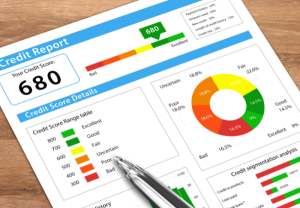A good credit score is crucial for financial well-being. It determines your eligibility for loans, credit cards, and other credit products. To understand your creditworthiness, you need to familiarize yourself with the credit score range and how it impacts your financial life.
A credit score is a three-digit number that estimates how likely you are to repay borrowed money and pay bills. It is usually on a scale of 300 to 850 and is calculated from information about your credit accounts. The highest credit score you can get is 850, but scores above 750 are considered excellent.
The two major credit scoring companies, FICO and VantageScore, both use a credit score range of 300 to 850. FICO breaks down credit scores into categories such as poor, fair, good, very good, and exceptional. On the other hand, VantageScore has ranges like subprime, near prime, prime, and superprime.
Key Takeaways:
- A credit score ranges from 300 to 850, with scores above 750 considered excellent.
- The two major credit scoring companies are FICO and VantageScore.
- FICO categorizes credit scores into poor, fair, good, very good, and exceptional.
- VantageScore uses ranges like subprime, near prime, prime, and superprime.
- Understanding your credit score range is essential for financial decision-making.
Factors Affecting Your Credit Scores
Several factors influence your credit scores. Understanding these factors is essential for maintaining and improving your creditworthiness. The four key factors that lenders consider when evaluating your creditworthiness are as follows:
- Credit History: Your credit history is a record of your past borrowing behavior. It includes details about your credit accounts, such as loans and credit cards, and how you have managed them. Lenders use your credit history to assess your payment reliability and determine the level of risk you pose as a borrower. A longer credit history with positive payment patterns can have a positive impact on your credit scores.
- Credit Utilization: Credit utilization refers to the amount of credit you are currently using compared to your overall available credit. It is calculated by dividing your total credit card balances by your total credit limits. Lenders consider lower utilization rates to be favorable, as it demonstrates responsible credit management. Aim to keep your credit card balances below 30% of your available credit limit to maintain good scores.
- Payment History: Payment history is one of the most crucial factors in determining your credit scores. Lenders want to see that you consistently make your payments on time. Late payments, missed payments, or defaults can significantly lower your credit scores. To maintain good scores, make sure to pay all your bills, loans, and credit card balances by their due dates.
- Credit Mix: Having a mix of different types of credit accounts can positively impact your credit scores. Lenders like to see a diverse credit portfolio that includes installment loans (such as auto loans or mortgages) and revolving credit (such as credit cards). This demonstrates your ability to manage different types of credit responsibly. However, it’s important to note that applying for too many credit accounts within a short period can have a negative impact on your scores.
- Credit Age: The length of your credit history is another crucial factor. Lenders prefer to see a longer credit history, as it provides a more comprehensive picture of your borrowing behavior. The longer you have responsibly managed credit accounts, the better it reflects on your ability to handle credit. Avoid closing your oldest credit accounts, as it can shorten your credit history and potentially lower your scores.
By understanding these factors and actively managing them, you can maintain good credit scores and improve your overall creditworthiness.
| Factors | Impact on Credit Scores |
|---|---|
| Credit History | Positive impact if longer with positive payment patterns |
| Credit Utilization | Lower utilization rates are favorable |
| Payment History | Consistent on-time payments are crucial for good scores |
| Credit Mix | Having a diverse mix of credit accounts can be beneficial |
| Credit Age | Longer credit history reflects positively on creditworthiness |
Importance of Having a Good Credit Score
Having a good credit score is vital for a variety of reasons. Lenders consider credit scores when determining loan qualification and credit card approval. A higher credit score can significantly increase your chances of being approved for a loan and help you secure lower interest rates, saving you money in the long run.
But it doesn’t stop there. Your credit score also has an impact on other aspects of your financial health. For example, when applying for an apartment, landlords often review credit scores to assess your reliability as a tenant. A good credit score can give you an advantage and make it easier to secure housing.
Additionally, a healthy credit score can open doors to a wider range of credit products and financial opportunities. Borrowers with scores above 750, for instance, often have access to 0% financing on cars and credit cards with attractive introductory interest rates.
The Power of Lower Interest Rates
One of the most significant benefits of having a good credit score is the ability to qualify for lower interest rates. When borrowing money, whether it’s for a mortgage, car loan, or personal loan, the interest rate directly affects the total cost of borrowing. A higher credit score signals to lenders that you are a responsible borrower and reduces the risk they associate with lending to you.
As a result, lenders are more willing to offer you loans at lower interest rates, which can translate into significant savings over time. For example, on a 30-year mortgage, even a slight reduction in the interest rate can save you thousands of dollars throughout the life of the loan.
Expanding your Financial Options
A good credit score not only improves your chances of loan approval and lower interest rates but also expands your financial possibilities. With a strong credit history, you’ll have a wider selection of credit products at your disposal. This includes access to credit cards with better rewards programs, higher credit limits, and more favorable terms.
Moreover, maintaining a good credit score allows you to qualify for favorable credit card offers, such as cards with 0% introductory interest rates. This can help you manage your finances more effectively and save on interest charges, especially if you need to make a large purchase or consolidate existing debts.
It’s important to note that your credit score isn’t fixed. By practicing good financial habits, such as paying bills on time and managing credit responsibly, you can improve and maintain a good credit score. Regularly monitoring your credit report for errors and taking steps to correct them, if necessary, is also crucial in maintaining a healthy credit score.
<!–
| Credit Score Range | Loan Qualification | Lower Interest Rates | Financial Health | Credit Products | Credit Card Approval |
|---|---|---|---|---|---|
| Poor (300-579) | Difficult | High | Challenged | Limited Options | Unlikely |
| Fair (580-669) | Possible with higher interest rates | Higher | Adequate | Somewhat limited | Possible, but with limited benefits |
| Good (670-739) | More likely | Moderate | Stable | Expanded options | Higher chances |
| Very Good (740-799) | Likely | Low | Healthy | Wide range | Improved chances |
| Exceptional (800-850) | Highly likely | Lowest | Excellent | Extensive options | Highly favorable |
–>
Conclusion
Understanding your credit score range and its impact on your financial well-being is crucial. A good credit score opens doors to better loan terms, lower interest rates, and increased financial opportunities. To improve your credit score, it’s important to focus on key areas such as making on-time payments, keeping credit card balances low, and managing a diverse mix of credit types.
Regularly monitoring and checking your credit report for accuracy is also essential. By doing so, you can identify any errors or discrepancies that may be negatively affecting your score and take the necessary steps to correct them. Remember, credit scores are not fixed and can change over time. It’s important to actively manage and work towards improving your creditworthiness for long-term financial stability.
By prioritizing credit score improvement and maintaining a good credit score, you can enjoy the benefits of better loan options, lower interest rates, and overall financial well-being. Take control of your financial future by actively managing your credit and making informed decisions to secure a healthier financial life.



